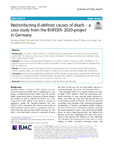2021-03-15Zeitschriftenartikel
Redistributing ill-defined causes of death – a case study from the BURDEN 2020-project in Germany
Wengler, Annelene
Gruhl, Heike
Plaß, Dietrich
Leddin, Janko
Rommel, Alexander
von der Lippe, Elena
the BURDEN 2020 study group
Background
The cause of death statistics in Germany include a relatively high share (26% in 2017) of ill-defined deaths (IDD). To make use of the cause of death statistics for Burden of Disease calculations we redistribute those IDD to valid causes of death.
Methods
The process of proportional redistribution is described in detail. It makes use of the distribution of the valid ICD-codes in the cause of death data. We use examples of stroke, diabetes, and heart failure to illustrate how IDD are reallocated.
Results
The largest increases in the number of deaths for both women and men were found for lower respiratory infections, diabetes mellitus, and stroke. The numbers of deaths for these causes more than doubled after redistribution.
Conclusion
This is the first comprehensive redistribution of IDD using the German cause of death statistics. Performing a redistribution is necessary for burden of disease analyses, otherwise there would be an underreporting of certain causes of death or large numbers of deaths coded to residual or unspecific codes.
Files in this item

